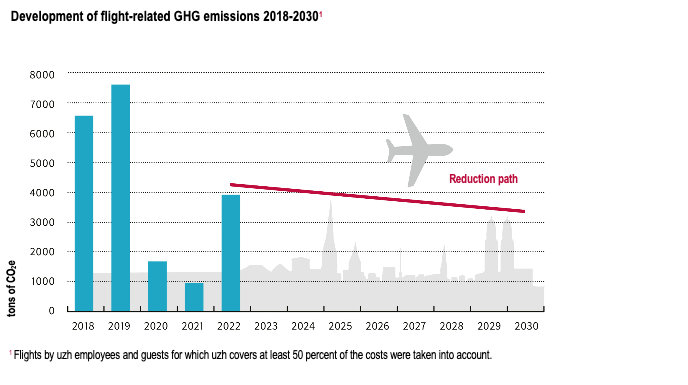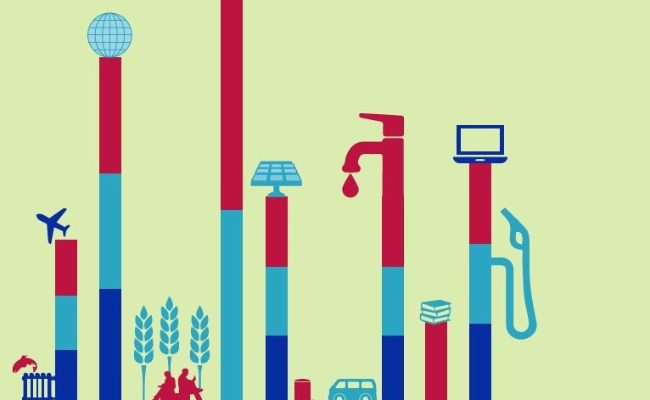University of Zurich publishes third sustainability report
The University of Zurich (UZH) has published its third Sustainability Report. Based for the first time on the goals of UZH’s “Implementation Strategy 2030 for the Sustainability Policy”, adopted in fall 2020, the report tracks the implementation of targets and measures.

UZH has committed itself to becoming climate-neutral by 2030. Over the past two years, the university was able to substantially reduce its overall greenhouse gas (GHG) emissions. In 2022, emissions were 14 % lower than in 2018, and in 2021 a full 38 % lower – although the 2021 decrease is largely attributed to the pandemic.
“The reporting years 2021/2022 were characterized by multiple crises. It is becoming increasingly clear that sustainability requires investment in crisis resilience,”
Prof. Lorenz M. Hilty, Sustainability Delegate at UZH.
GHG emission savings primarily through changes concerning air travel
Compared to the pre-pandemic years 2018 and 2019, UZH was able to reduce air-travel-related GHG emissions. The main goal for 2022 was to not exceed 60% of pre-pandemic levels, and it was achieved.

The goal applied to all faculties, which were tasked with developing their own action plans to reduce air travel or related emissions. The Faculty of Arts and Social Sciences, for example, introduced an internal levy on air travel, charging CHF 130 per tonne of CO2 emitted and a minimum of CHF 130 per flight.
For every CHF 130 raised, CHF 100 is paid into a fund that the faculty can use to finance travel by train and bus instead, doubling the incentive effect. The negotiations for that levy went surprisingly smoothly, as the faculty dean, Prof. Katharina Michaelowa, reports on sustainability.uzh.ch (in German).
Researchers from the Digital Society Initiative (DSI) organized a European hub for the three-day Sunbelt conference that took place in Australia. By following the conference from this hub instead of traveling down under, European academics avoided around 38 tonnes of greenhouse gas emissions.
These examples show that sustainability starts with the engagement of the people involved. More information about air travel at UZH is presented on the UZH sustainability website.
Interdisciplinary research is key to sustainable development
Over 30 research-related groups, centers, collaborations and networks of UZH are presented as contributors to sustainability in the third Sustainability Report.
UZH considers interdisciplinary research to be key to sustainable development. 13 University Research Priority Programs, 25 Centers of Competence and many other research centers or networks serve to strengthen interdisciplinary research at UZH. In addition, individual faculty members and research groups cooperate with each other or with external partners in inter- or transdisciplinary projects.
The Center for Crisis Competence founded in 2021 is one of the interdisciplinary research centers at UZH that contributes to sustainable development. As crises put sustainability measures at risk, crisis resilience is an important factor contributing to a sustainable future. This resilience requires a sound understanding of the nature of crises and ways to deal with them. For this purpose, the Center for Crisis Competence brings together experts from all seven UZH faculties.
More information on sustainability research can be found online or within the Sustainability Report 2021/2022 (in German).
Teaching for a sustainable future
27,895 students were enrolled at UZH, Switzerland’s largest university, in the Fall Semester of 2022. An important part of UZH’s sustainability strategy is anchored in teaching. Because education should prepare people for the profound changes to come, courses at UZH aim to enable students to understand their subject area in the context of sustainable development.
The “Grüne Vorlesungsverzeichnis” (green course catalogue) automatically filters courses that address topics related to sustainable development. The aim is to provide students and other interested parties with a quick overview and access to courses related to sustainability.
During the reporting period of the third Sustainability Report, the UZH Sustainability Team designed the inter- and transdisciplinary study week “Sustainable Development and Transformation” for interested Master’s students. The study week was first implemented in September 2023 and is planned to be repeated annually.
Other examples of teaching in a sustainable context presented in the third Sustainability Report include the public lecture series “Sustainability Now!” and the new biodiversity degree program, which is unique in Switzerland.
Outreach
UZH is part of many national and international networks to coordinate efforts and commitments to sustainable development. As an example, the third Sustainability Report presents the new networking partner Blue Community, which UZH joined in May 2022. Read more about UZH’s sustainability networks and the four pillars of the Blue Community.
